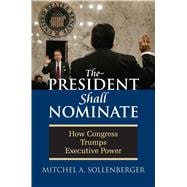
| Acknowledgments | p. xiii |
| Introduction | p. 1 |
| The Pre-nomination Process | p. 3 |
| Additional Concerns of This Study | p. 3 |
| Existing Research | p. 5 |
| Organization of This Book | p. 6 |
| Constitutional Principles | p. 8 |
| Continental Congress | p. 8 |
| State Constitutions | p. 12 |
| Constitutional Convention | p. 13 |
| State Ratification Conventions | p. 16 |
| The Federalist Papers | p. 19 |
| Correspondence between John Adams and Roger Sherman | p. 20 |
| Establishing the Pre-nomination Process (1789-1829) | p. 22 |
| Senatorial Courtesy | p. 23 |
| The Rejection of Benjamin Fishbourn | p. 24 |
| James Iredell and the Consent of Senator Benjamin Hawkins | p. 30 |
| William Maclay and Home-State Support | p. 30 |
| George Washington (1789-1797) | p. 31 |
| John Adams (1797-1801) | p. 33 |
| Thomas Jefferson (1801-1809) | p. 35 |
| James Madison (1809-1817) | p. 37 |
| James Monroe (1817-1825) | p. 39 |
| John Quincy Adams (1825-1829) | p. 43 |
| The Spoils Era I (1829-1845) | p. 47 |
| Andrew Jackson (1829-1837) | p. 47 |
| Martin Van Buren (1837-1841) | p. 55 |
| William Henry Harrison (1841) | p. 59 |
| John Tyler (1841-1845) | p. 62 |
| The Spoils Era II (1845-1869) | p. 67 |
| James K. Polk (1845-1849) | p. 68 |
| Zachary Taylor (1849-1850) | p. 71 |
| Millard Fillmore (1850-1853) | p. 72 |
| Franklin Pierce (1853-1857) | p. 73 |
| James Buchanan (1857-1861) | p. 76 |
| Abraham Lincoln (1861-1865) | p. 78 |
| Andrew Johnson (1865-1869) | p. 80 |
| Birth of Civil Service Reform (1869-1881) | p. 86 |
| Ulysses S. Grant (1869-1877) | p. 86 |
| Rutherford B. Hayes (1877-1881) | p. 94 |
| James A. Garfield (1881) | p. 101 |
| The Pendleton Act: Patchwork Reform (1881-1897) | p. 105 |
| Chester A. Arthur (1881-1885) | p. 105 |
| Grover Cleveland (1885-1889) | p. 111 |
| Benjamin Harrison (1889-1893) | p. 118 |
| Grover Cleveland (1893-1897) | p. 122 |
| McKinley to Ford: The Tradition Continues (1897-1977) | p. 126 |
| William McKinley (1897-1901), Theodore Roosevelt (1901-1909), and William Howard Taft (1909-1913) | p. 126 |
| Woodrow Wilson (1913-1921) | p. 131 |
| Warren G. Harding (1921-1923), Calvin Coolidge (1923-1929), and Herbert Hoover (1929-1933) | p. 132 |
| Franklin D. Roosevelt (1933-1945) | p. 135 |
| Harry S Truman (1945-1953) | p. 137 |
| Dwight D. Eisenhower (1953-1961) | p. 138 |
| John F. Kennedy (1961-1963) and Lyndon B. Johnson (1963-1969) | p. 139 |
| Richard M. Nixon (1969-1974) | p. 142 |
| Gerald R. Ford (1974-1977) | p. 145 |
| Carter to Bush II: A Lasting Legacy (1977-2007) | p. 147 |
| Jimmy Carter (1977-1981) | p. 147 |
| Ronald Reagan (1981-1989) | p. 150 |
| George H. W. Bush (1989-1993) | p. 153 |
| William J. Clinton (1993-2001) | p. 156 |
| George W. Bush (2001-2007) | p. 160 |
| Analysis and Conclusions | p. 169 |
| Republicanism and Constitutional Legitimacy | p. 170 |
| The Practical Duty to Consult | p. 171 |
| Institutional and Political Influences | p. 171 |
| Participation in the Pre-nomination Process | p. 173 |
| Failure to Consult: Congressional Responses | p. 174 |
| Congressional Specification of Qualifications | p. 176 |
| Nonstatutory Limits to the President's Appointment Power | p. 180 |
| Reformers Seeking Nonpolitical Remedies | p. 181 |
| Rise of the Unitary Executive School | p. 182 |
| Interpretive Value of Originalism and Textualism | p. 185 |
| Final Remarks | p. 189 |
| Notes | p. 191 |
| Bibliography | p. 269 |
| Index | p. 293 |
| Table of Contents provided by Ingram. All Rights Reserved. |
The New copy of this book will include any supplemental materials advertised. Please check the title of the book to determine if it should include any access cards, study guides, lab manuals, CDs, etc.
The Used, Rental and eBook copies of this book are not guaranteed to include any supplemental materials. Typically, only the book itself is included. This is true even if the title states it includes any access cards, study guides, lab manuals, CDs, etc.